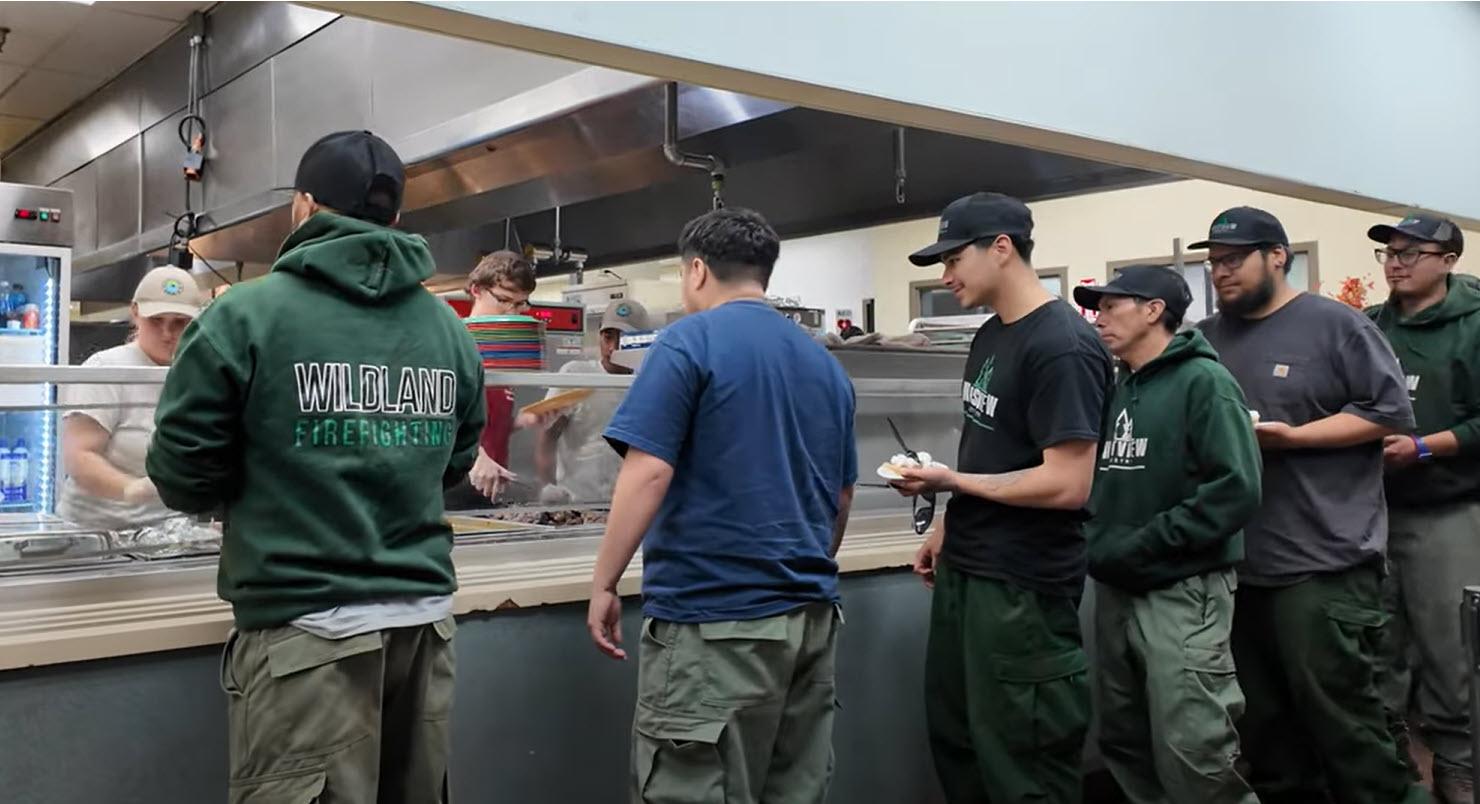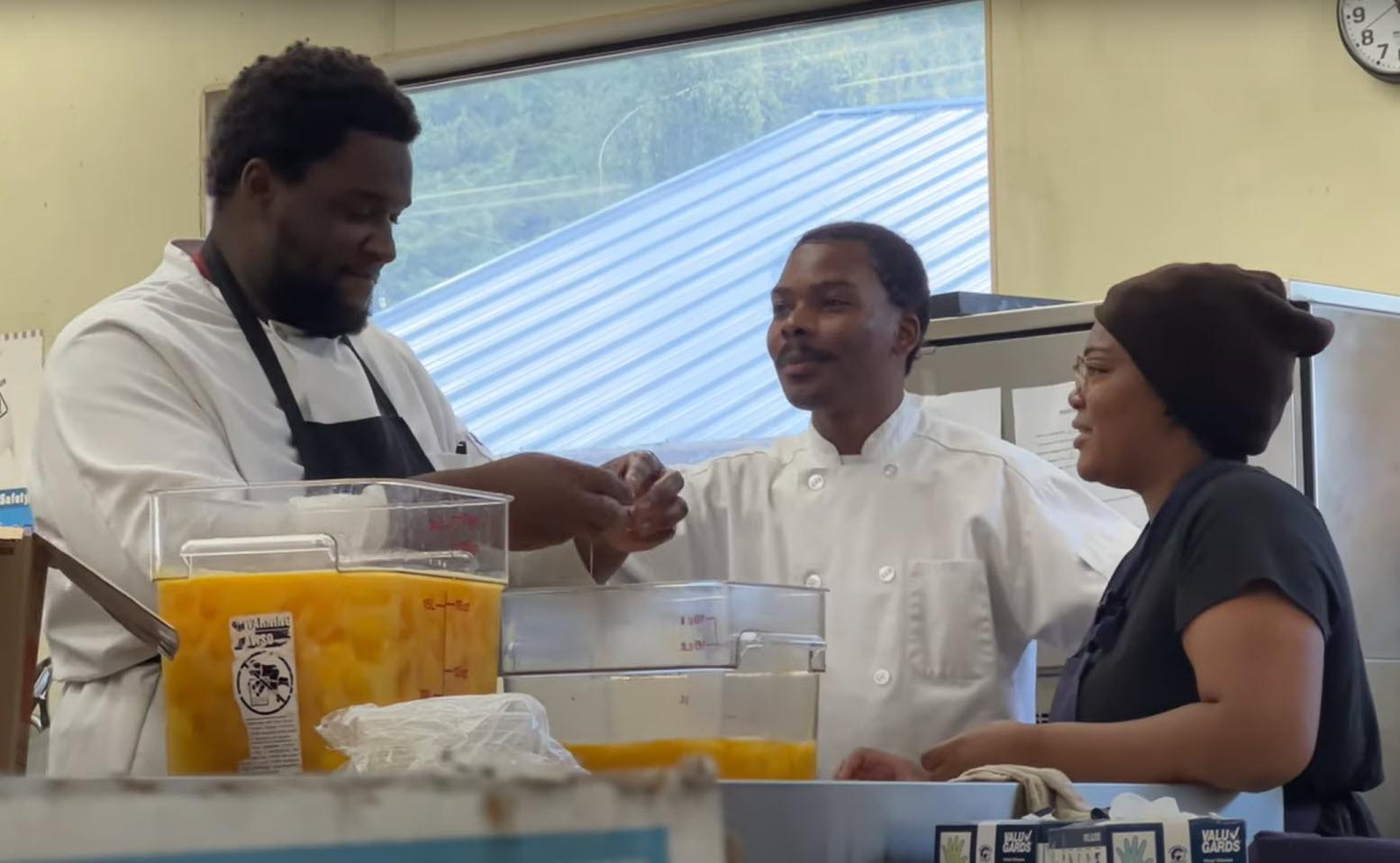It’s been a long, grueling day on the fire line. Wildland firefighters, with faces full of soot and ash file wearily towards the building at the center of the camp. A door swings open, and bright yellow fabric lines the exterior walls of the room. The aroma of sautéed vegetables entices the firefighters inside. Bright pots and pans are a warm welcome from the outdoor elements. Inside a bustling kitchen is alive with Job Corps advanced culinary students moving with purpose to feed wildland firefighters returning from a day of taxing work.
Each year. the U.S. Department of Agriculture’s Forest Service uses a strategic and science-based approach to make a measurable impact to reduce wildfire risks. Wildland firefighters risk their lives to protect vulnerable areas, facing numerous challenges along the way. Recognizing the human cost of wildland firefighting and the inherent danger during the fire year remains a priority for the Forest Service, as well as the physical and mental well-being of that workforce.
Sometimes that well-being comes in the form of a hot meal. During the Sandstone Fire on August 2024, Job Corps culinary students from Treasure Island Job Corps in San Francisco, supported wildland firefighters with meals at the Timber Lake Job Corps Civilian Conservation Center in Estacada, Oregon.
The students offered a moment of respite and camaraderie for wildland firefighters returning after a day of exhaustive work. Naala Raines is one of the advanced culinary students from Treasure Island Job Corps.
“It’s actually been very exciting,” said Raines. “I feel like I’m helping, and I really like seeing the firefighters come in here. I know they’re hungry, and I like being able to give them a hot meal after they’ve worked so hard.”
Job Corps is an interdepartmental relationship between the U.S. Department of Labor and the U.S. Department of Agriculture’s Forest Service. While the Department of Labor owns and provides policy and operational funding for the program, the Forest Service operates Civilian Conservation Centers (CCCs) that have a heavy focus on preparing students for conservation-focused trades and giving them unique opportunities to serve America by supporting natural disasters. The Forest Service is the only federal operator of Job Corps centers, giving students like Raines a direct experience and unique opportunity to be outdoors.
“I didn’t realize that there would be soot or ash on some of their faces,” said Raines. “It was really kind of cool because I know they came from the fire.”
Students who attend Job Corps may not have had much experience with the outdoors. Learning about our sense of place helps us become more aware and understanding of the connections these places uniquely offer. It is through our sense of place that we learn how to connect, both to nature and each other.
Certifications to early risers
Quincy Rouser, advanced culinary student, Treasure Island Job Corps, gets up early every morning to get the firefighters breakfast before they head out to the fire line.
“What I really like about it is that we come all the way out here, miles out, to help feed people that need it,” said Rowser. “They’re out here fighting fires for the locals, so it’s just kind of gratifying to be able to help people that actually need it and do something that you love at the same time.”
Students that attend Job Corps get to experience real hands-on training, and those that attend Forest Service CCCs get to experience and enhance their environmental literacy and learn about trades in conservation. Every student that attends a Forest Service CCC is considered a steward of conservation.
Patrick Owens, western coordinator, Job Corps National Office-Fire and Aviation Management witnessed the students evolve from the very beginning, when they got certified to cook, to when the students arrived at Timber Lake Job Corps CCC when the real work began.
“I watched the students from the beginning handing in the certificates and paperwork, to arriving on center seeing the kitchen they are cooking in and the tent they would be sleeping in,” said Owens.
The students felt gratified knowing they were gaining practical experience cooking in a fast-paced environment like their firefighter counterparts.
“They told me they were excited to feed the firefighters who were working out on the line,” said Owens. “They felt that they could help by preparing a hearty meal.”
Wildland firefighters spend long days doing grueling and demanding work in the outdoors. Getting a hot meal is extremely important and plays a huge role in morale and long-term performance for those returning from the fire line.
“It is extremely important for a large, well-balanced meal after a long and hot fire shift on the line,” said Owens. “Any fire support effort makes a huge impact on getting the fire contained.
“We plan to continue this relationship in the future,” he continued.
Passion, precision and parody
Izabel Justis, advanced culinary student, Treasure Island Job Corps in San Francisco, is a former student at Timber Lake Job Corps CCC, where she laid the foundation for her culinary training.
Sharlton Holt, center director, Timber Lake Job Corps CCC, Estacada, Oregon, said that Justis was passionate about the culinary trade and demonstrated remarkable dedication. She took the basic culinary skills she learned at Timber Lake and enhanced them at Treasure Island Job Corps, preparing her for a successful career ahead.
Apart from gaining hands-on experience and valuable life skills, she was able to reflect on a comical experience in her own personal time with nature.
“The bugs are what get me,” said Justis. “Actually, last night I headed back to our yurt, there was a grasshopper on our yurt door, and I freaked out. I also freaked out my work buddy and accidentally woke up the boys, but it was fun sleeping out in a yurt and coming to cook here!”
Even though the grasshopper scare let her know that she was back in nature, Justis felt that the overall experience was something she’ll look back on with fondness.
“In the kitchen, yes, you work hard,” said Justis. “But also, we like to make it a happy place and have fun while doing it.”
When working in the kitchen, Justis felt the surge of creativity and teamwork.
“It’s the rush about everything,” said Justis. “The rush makes it interesting ‘cause you’re on your feet all the time. You’re cooking multiple things at once. It’s also the unexpected things. ‘Cause when things are unexpected, it makes it interesting.”
Changing one life at a time
Each year the Forest Service Job Corps contributes hundreds of thousands of hours to supporting conservation efforts across the nation. In fiscal year 2024, Forest Service Job Corps students performed over 700,000 hours supporting the “Wildfire Crisis Strategy,” conservation work out in local communities and on national forests, and rural development projects on public lands.
Job Corps wants to provide unique opportunities to students like Alex Lennon, advanced culinary student, Treasure Island Job Corps, to learn more about themselves, and how they can connect with their past.
“I saw a lot of stuff I haven’t see in a while, or in general,” said Lennon. “I love nature, this is ideal for me. I haven’t seen grasshoppers since I left my home country in Jamaica. That was like a trip down memory lane.”
Lennon came to the United States when he was younger and lived in various places before he heard about Job Corps.
“From the Bronx, New York, lived there for nine years,” said Lennon. “Moved to Florida, and while I was there, I was jobless.”
Lennon saw an ad for Job Corps on social media and had greater career ambitions than what he was currently experiencing.
“I realized there was nothing for me there, to be honest,” said Lennon. “So, I reached out to Job Corps in Miami and finished the culinary basic program in two months. I decided to wait and went from there to Treasure Island Job Corps, and from there I went to Timber Lake Job Corps helping out for the fires.”
Lennon said that during his time at Job Corps he learned more about himself.
“I’m more social than I thought I was, to be honest,” said Lennon. “I’m more social.”
Looking ahead, students like Lennon are empowered to transform the skills and experiences they’ve gained from Job Corps and enter the workforce for a successful career.
“After I leave Timber Lake Job Corps, I go back to Treasure Island and I graduate,” said Lennon. “Then go back to Florida, where I currently reside. Then I’ll be in a culinary business.
“Shout out to Timber Lake Job Corps for having us here and looking forward to working with you guys again,” said Lennon.









